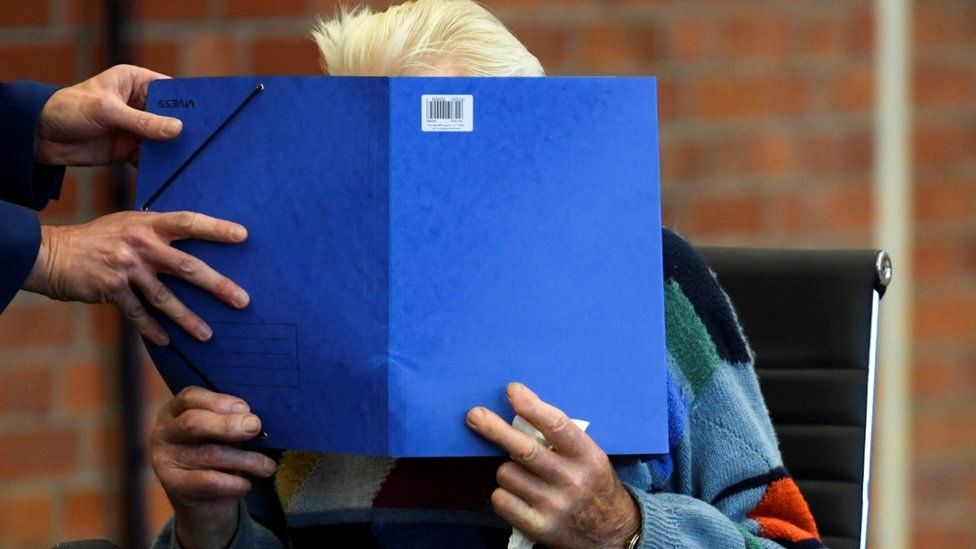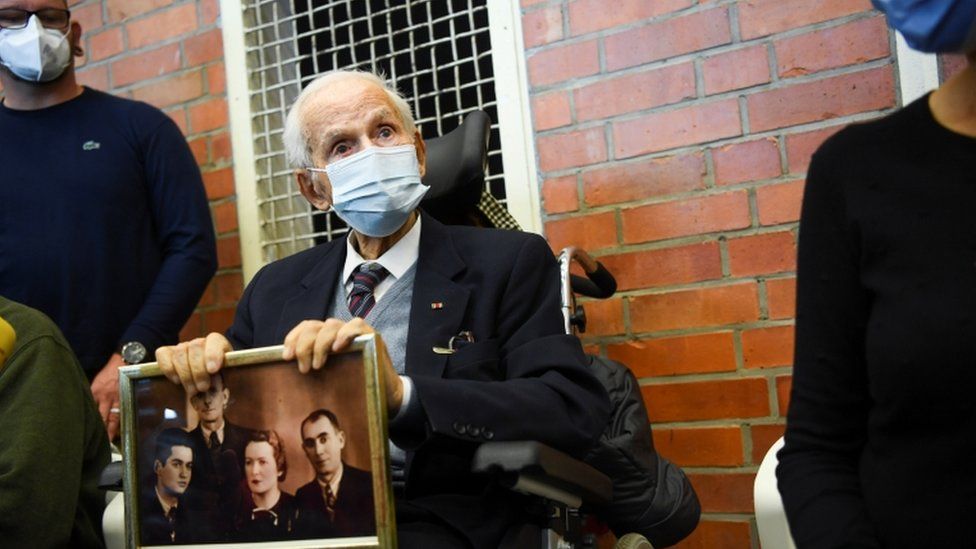Centenarians Bearing Witness
Centenarians Bearing Witness
"The defendant supported this [systemic mass murder at Sachsenhausen between 1941 and 1945] knowingly and willingly - at least by conscientiously carrying out guard duty, which was perfectly integrated into the killing regime."Public prosecutor Cyrill Klement, Neuruppin, Germany"[This was the] last trial for my friends and acquaintances and my loved ones who were murdered.""It is a very important day for me. This was an SS man. I hope he gets convicted."Leon Schwarzenbaum, 100-year-old survivor of Sachsenhausen"This is unknown to me because I know nothing about it. [I am] innocent.""Everything is torn [dans ma tête]. [I am] alone here."Josef Schutz, former non-commissioned officer of the “Totenkopf” (Skull) division of the Waffen-SS"He pretends not to know while he remembers everything perfectly in detail!""It is not bad! It is purely a manipulation of the lawyer who has opted for this strategy of silence."Antoine Grumbach, 79-year-old Frenchman
 |
| Josef Schutz, who was 21 when he first became a guard at Sachsenhausen in 1942, appears in court Reuters |
Shocking that a man who reached the ripe old age of a century now faces a public prosecution for his part in enabling a genocide. That at age 100 he cannot simply be left in his final months and days, perhaps years, to live in peace. Shocking that he has lived to age one hundred having been part of the world's most infamous killing machine. Shocking that he has lived a normal life, unperturbed at his role as a dutiful (Lithuanian extraction) German during the Third Reich, following orders to view Jews as vermin with a duty to obliterate their noxious presence.
Shocking that fate was so tolerant of those like him, ushering him into a long life.
Did he ever, in those years contemplate what he had taken part in? Did he find it useful to excuse himself from responsibility, consoling himself with the reality of the temper of the times? Does he to the present day, ever think of the millions of people whose lives were extinguished because they were people of conscience who opposed the Nazi regime, political opponents, gays, Roma, prisoners-of-war, and above all Jews from every walk of life, the elderly, women and children; the men who died of exposure and hunger and disease during their slave labour incarceration?
Would it have been at all of any use to him, to his victims, to the world at large -- doubtful that the Holocaust really occurred, and those who accept that it did, struggling to fully comprehend the evil that humanity is capable of, to be confronted by a man his own age who somehow managed to survive the labour camps and the death camps, a man whose entire family was murdered -- for a conversation between them, the enabler and the victim? Would it clarify anything? Would it ease the pain?
Josef S., a member of the paramilitary SS of the Nazi party is charged in a German court of contributing to the deaths of 3,518 people. These were people too ill and debilitated, starving skeletons, unable to be prodded into a death march before the onslaught of Allied troops, who were shoved into a purpose-built chamber to be gassed with Zyklon B. before the arrival of Soviet troops. Josef S. spent his time between 1942 and 1946 standing guard in the Sachsenhausen watchtower. He was declared medically fit to stand trial.
He is frail, he uses a walker and without doubt he would prefer to be anywhere else than in that courtroom. In that courtroom, watching, listening, taking note, are other elderly people, Jews, among whom is one whose age matches that of the former camp guard. A man of 100 who brought along a prized photograph, of himself as a boy with his mother, his father and his uncle, all dead, whose ashes fertilized the fields when smoke from the chimney of the gas chamber scattered them around the concentration camp.
The defendant's face is obscured when photographs are taken. It was mostly political prisoners from around Europe, Soviet prisoners of war and Jews housed at Sachsenhausen. "It's a lot of emotion ... I can't really speak", 79-year-old Antoine Grumbach said tearfully. His father was a French resistance fighter. The accusation against the defendant is that of "contributing to cruel and insidious murders:giving aid in "creating and maintaining life-threatening conditions in the camp".
 |
| Leon Schwarzbaum survived Sachsenhausen as well as Auschwitz and Buchenwald Reuters |
Why did it take so long? Why were these conscienceless enablers not brought to justice long ago? The wheels of justice are warped, not round, but square and it takes them an intolerably long time to reach their goal. These few pitiful elderly figures represent a mere minuscule fraction of a fraction of the total force numbers like themselves who made it possible for Nazi Germany to carry out its ambitious goal of genocidal mass annihilation of a people.
Opened in 1936, 84 years ago, Sachsenhausen was one of the earliest of the Nazi concentration camps, serving as a training source for SS guards who, once graduated in the fine art of guarding helpless men, women and children, carried on their important tasks in other similar camps, serving across Europe, including in Auschwitz and Treblinka.
In 2011, a court ruling stated that those who contributed indirectly to wartime atrocities without being actively engaged in murder themselves could bear criminal responsibility. At Sachsenhausen SS guards put on doctor’s white coats to hand out soap and towels to those destined for the gas chamber, to convince them they were entering a room for to receive medical treatment or a shower. There, they were gassed to death.
 |
| Hiding in shame: Former concentration camp guard Josef S covers his face with a folder in court (GETTY) |
"It is true that the accused is a very old man, but so is the Auschwitz survivor who arrived today, he is also 100 years.""And, of course, there are very, very many victims who would also have liked to enjoy a full life and life to an old age, but who were not able to.""Thankfully, however, there is no expiry date on justice."Dr. Hans-Jürgen Förster"Today really means a lot for me, especially as someone who has been directly involved in providing information to the German authorities in cases such as these, and also as someone who knows survivors of Nazi concentration camps.""Josef S was a member of the SS, and was at the concentration camp in Sachsenhausen, and because of his job this means was part of the wider machine of death. This was his job. It is therefore right that he should be tried for this, as should the few remaining Nazis that are still alive."Dr. Efraim Zuroff, leading Nazi hunter, Simon Wiesenthal Center, Israel
Labels: German Guard, Holocaust, Justice, Sachsenhausen Concentration Camp

<< Home